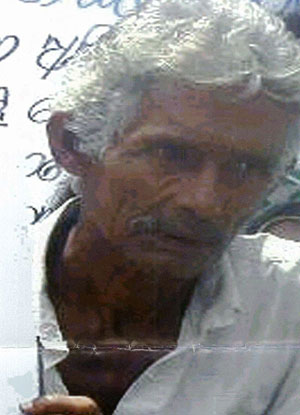 Elaris Fernando of Kandana is a special friend of the Asian Human Rights Commission (AHRC). He passed away today, April 14, after suffering from worm illness. In 2002, when his grandson was tortured by a group of policemen at the Kandana police station, Elaris Fernando began a fight seeking justice against such behaviour. His fight continued to the last.
Elaris Fernando of Kandana is a special friend of the Asian Human Rights Commission (AHRC). He passed away today, April 14, after suffering from worm illness. In 2002, when his grandson was tortured by a group of policemen at the Kandana police station, Elaris Fernando began a fight seeking justice against such behaviour. His fight continued to the last.
Lalith Rajapaksa was Elaris Fernandos grandson. Elaris was a labourer who carried heavy loads at the Colombo harbour, transporting goods. Later, he took to felling trees as his job. As an expert tree feller, his services were sought by many. When his grandson ceased to go to school due to some problems, he took custody of him and Lalith accompanied him in his work. Lalith was 17 when he was seriously tortured by the Kandana police. Due to the severe abuse, Lalith fell completely unconscious and was taken to the hospital, where he remained unconscious for over two weeks.
Elaris heard of his grandsons arrest a day later, and immediately came to the Kandana police station to see him. He found Lalith unconscious on the floor of the police station. Due to the old mans shouts, a police officer came and took Lalith to the hospital.
Elaris Fernandos’s timely intervention saved his grandsons life. He sought the assistance of many to complain about the torture, but was not successful. Finally, he met a lawyer interested in human rights, who introduced him to the AHRC. After narrating the details of his story to an AHRC representative, he stated that all these things happen to us because we are poor. His sense of powerlessness and deep indignation was clearly seen on his face. He vowed to do all he could to seek justice to the very end, if he could only find the assistance of someone to take this matter to court.
Elaris was assisted by the AHRC to first take the case to the magistrate court at Wattala, and then to the Supreme Court by way of a fundamental rights application. Elaris also accompanied Laliths mother to the magistrate and high courts when the case was finally filed under Sri Lankas torture law, the CAT Act no. 22 of 1994, against two police officers who allegedly tortured Lalith.
Several years later, when the trial was taken up at the Negambo High Court, Elaris was there to give lengthy evidence. He bravely answered a long cross-examination stating truthfully and with conviction everything that he saw and heard relating to the matter. To be a witness in seeking justice for his grandson was a matter of pride for Elaris.
There were many attempts by police officers and local politicians to convince Elaris to abandon the case. He refused to give in to this pressure and told his own political party leaders, I have all my life voted for you and perhaps in the future also I may vote for you. However, don’t ask me to abandon my request for justice for my grandson. Even if you cut my neck you will not get that response from me. He pursued his case to the very end, when he fell seriously ill.
At one stage, the officer in-charge of the police station even attempted to poison Elaris through a trader who had a small shop close Elaris house, but the trader did not cooperate and the attempt failed.
Elaris died without being able to see justice being done to his grandson. The Sri Lankan justice system today fails the ordinary citizens of the country. Elaris Fernando is a symbol of the ordinary folk of Sri Lanka who want justice. With an iron will, Elaris pursued his cause for justice. The belief that the weak and innocent do not seek justice, that they are subdued, was disproved by this grand old man who firmly stood seeking justice, despite all adverse circumstances.
The Asian Human Rights Commission honours the memory of Elaris Fernando, the courageous old man who has left a memory worthy of imitation by other Sri Lankans. We express our condolences and solidarity with Elaris grandson and other family members